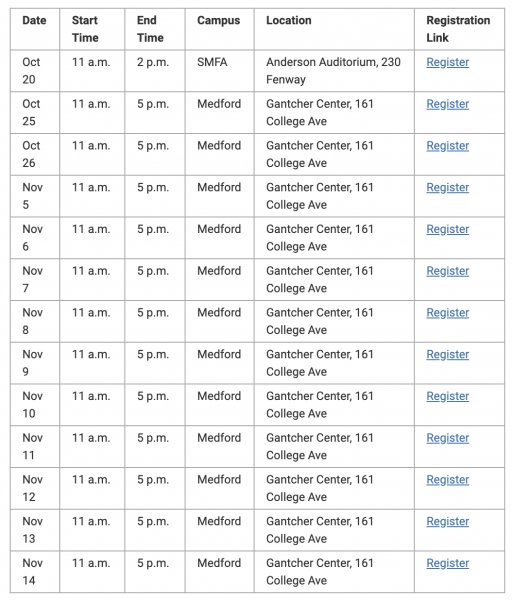Before the coronavirus pandemic became all the talk at Tufts, there was another virus that worried students — the flu. Like every year, the flu is expected to arrive on campus in late fall and winter. However, unlike COVID-19, there is a vaccine for the flu, and for the first time, students are required to receive it.
The Massachusetts Department of Public Health released a statement in August requiring all students attending college in Massachusetts to receive the influenza vaccination annually.
In-person students are required to receive the influenza vaccination by Dec. 31, 2020, but Tufts Health Service is asking that students be vaccinated by Nov. 19, 2020. Students who receive their vaccination from a pharmacy or primary care provider must upload documentation of their immunization to their patient portal, while students who are vaccinated at a Tufts flu vaccine clinic will have their information automatically updated.
Those who wish to apply for medical or religious exemption must complete an online form through Health Service.
Michelle Bowdler, executive director of health and wellness at Tufts Health Service, encourages students to get vaccinated as soon as possible and wherever is most convenient.
“We are strongly encouraging anybody who happens to be in Davis Square … to just go to a local pharmacy with your insurance card. The vast majority of insurances cover the flu vaccine as a preventative,” Bowdler said.
Vaccinations through Tufts are available with an appointment between Oct. 20 and Nov. 14. A full schedule of clinic dates and appointment registration links can be found in an Oct. 13 email sent to students.
Mark Woodin, senior lecturer in the Department of Public Health and Community Medicine at Tufts University School of Medicine, said Tufts is making the flu vaccine easily accessible for students this fall, but he noted that it may not have been a requirement without pressure from the Massachusetts Legislature.
“I'm not sure what Tufts would have done as an individual institution but the main reason Tufts (and all other schools) is requiring influenza vaccination this year is because the State of Massachusetts has mandated that all students (including preschoolers) from K-12 and all college students must be vaccinated against influenza this year,” Woodin said.
Taisuke Sato, a sophomore and a member of the Tufts for Health Equity club, talked about the implications of the Massachusetts flu vaccine mandate on marginalized communities.
“Though Tufts can mandate all students to get vaccinated and provide the resources to achieve this goal, not every Massachusetts community is as fortunate as a college campus,” Sato said.
As a member of Tufts for Health Equity, Sato has been confronting inequality in health care for some time. He notes that people of color, low-income communities and recent immigrants are finding it more difficult to get vaccinated.
“In order to prevent an outbreak, over 70% of the community must be vaccinated,” Sato said.
Last year, people ages 18–49 as well as minority communities were vaccinated at lower rates than the national average, and the U.S. vaccination rate overall was at 51.8% — well below the Center for Disease Control and Prevention’s goal of 70%. Public health officials are concerned because many of the families experiencing difficulty accessing the influenza vaccine are the same families working front-line jobs, putting them at a higher risk of exposure to both COVID-19 and the seasonal flu.
“While everyone waits for a vaccine to protect against COVID-19, the best people can do is to arm our immune system with the tools to fight Influenza to avoid a superinfection,” Woodin said.
Woodin said exposure to both influenza and COVID-19 could lead to serious complications since both viruses impact the respiratory system.
”The influenza vaccine does not help protect against getting it but since both influenza and COVID-19 primarily attack the lungs, a situation where a person has influenza and then gets COVID-19 is one that we obviously want to avoid,” Woodin said.
Given this potential for the spread of both illnesses, health officials are especially worried about misinformation regarding the flu vaccine this year.
A study conducted in 2014 revealed that a lack of information and misperceptions about the flu vaccine result in fewer vaccinations in low-income communities, regardless of age, gender or ethnicity. Health officials say it is important to spread accurate information regarding the flu vaccine to counteract misinformation.
Marie Caggiano, medical director of Health Service, reiterated that the influenza vaccination is safe despite any misinformation saying otherwise.
“The flu vaccine that we have is well-tested and is very safe … There are a lot of myths out there, and if anyone has specific concerns … I would just encourage them to be in touch with a clinician or a nurse at Health Service and discuss those concerns,” Caggiano said.
In terms of Tufts itself, ensuring that as many community members as possible are vaccinated for influenza is especially important this year to avoid not only dual infection, but also confusion between COVID-19 and flu symptoms.
“It’s obviously a year where if someone gets a fever or presents with a cough there is concern that those symptoms are also associated with coronavirus, and the more we can protect ourselves from all of these respiratory viruses, the better off we’re going to be,” Caggiano said.
Caggiano explained that the flu, like COVID-19, is an unpleasant and potentially serious sickness.
“Flu can be a severe illness. Every year, there are thousands of people in the United States who die from the flu, so any year is really a good time for people to protect themselves with vaccination,” Caggiano said.
To protect themselves from both the flu and COVID-19, Tufts community members are encouraged to continue following all proper COVID-19 safety protocols, as well as engage in healthy lifestyles, according to Marianne Coscia, nurse manager at Health Service.
“Keeping your immunity up, getting rest, eating right and exercising, all those things are going to help you fight off any kind of virus,” Coscia said.
Bowdler added that the key difference between flu prevention and COVID-19 prevention is that a flu immunization is widely available while a COVID-19 vaccine is not.
“We do have a [flu] vaccine, which in some years is not 100% effective, but even when people get the flu, it seems like they have a less serious course of illness,” Bowdler said. “We’re lucky to have it, and we want people to take advantage of it.”







